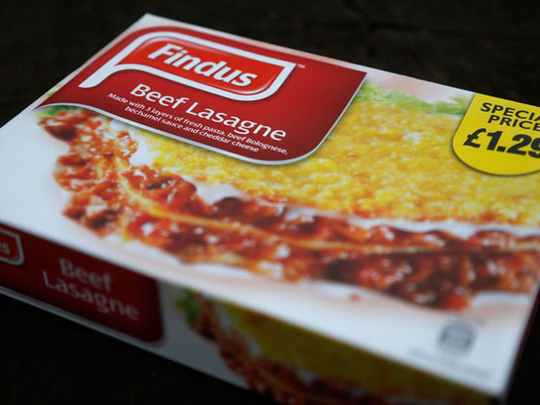
London: Britain’s horsemeat lasagne food scare spread to several other European countries on Friday as officials said they suspected criminal activity was behind the growing scandal.
Swedish food giant Findus withdrew various frozen meals from France and Sweden, a day after withdrawing frozen beef lasagne from sale in Britain that was found to contain up to 100 per cent equine flesh.
The British supermarket chain Aldi meanwhile announced on Friday that two ready meal ranges contained similar quantities of the meat.
The meals were all produced in Luxembourg for French supplier Comigel and the company said the horsemeat originated in a Romanian abattoir.
British Prime Minister David Cameron called the scandal “completely unacceptable” and police said officers had met with Britain’s Food Standards Agency (FSA) to discuss the matter.
Britain’s environment minister Owen Paterson said he would hold a “horsemeat summit” with the FSA and retailers to tackle the problem.
“I’ve got a nasty feeling it’s actually a criminal conspiracy and that’s why it’s quite right for the FSA to engage the Metropolitan Police, who are working with other police forces across the mainland of Europe,” he said.
He added that there was no risk to human health from the meals and said he would eat them himself.
On Thursday the FSA announced that 11 of 18 samples of Findus beef lasagne were found to contain between 60 and 100 percent horsemeat.
A Findus spokesman was quoted in The Guardian newspaper that it was told by Comigel about the horsemeat on Saturday but did not issue a product recall then, saying it was “a question of logistics.”
Aldi announced on Friday that tests on its Today’s Special brand of frozen beef lasagne and frozen spaghetti bolognese found they too contained between 30 per cent and 100 per cent horsemeat. The company said it felt “angry and let down” by Comigel.
Scotland Yard said it had “met with the Food Standards Agency at their request and will continue to liaise with them” but added that there was “no investigation at this time.”
Comigel director Erich Lehagre said the horsemeat originated in a Romanian abattoir and was provided to Comigel via a meat-processing company called Spanghero, based in southwestern France. The meals were then produced in Luxembourg by a supplier called Tavola.
Speaking in Brussels after a European Union summit, Cameron described the situation as “very shocking”.
“People will be very angry to find out they have been eating horse when they thought they were eating beef. This isn’t really about food safety - it’s about effective food labelling,” Cameron said.
The FSA said it had ordered further tests on the suspect lasagne for the veterinary drug phenylbutazone, which can cause a serious blood disorder to humans in rare cases.
All Findus frozen beef lasagnes have been recalled from Swedish stores while in France, the company is withdrawing three products - lasagne, cottage pie and moussaka.
It is the latest horsemeat-related scare to his Europe after equine DNA was found two weeks ago in beefburgers in Britain and Ireland, countries where horsemeat consumption is generally taboo.
Millions of the burgers have been removed from sale.
The consumption of horsemeat is more common in other parts of Europe including France, as well as in central Asia, China and Latin America.
Comigel said earlier that it had withdrawn all products from a meat supplier that had provided it with horsemeat instead of beef, but insisted that veterinary services in France and Luxembourg had said the horsemeat in question “does not raise any public health issue”.
Comigel supplies frozen meals to supermarket chains and other clients in 16 countries, with Germany, The Netherlands, Belgium and Scandinavia the main markets and Findus among the brands it has contracts with.
Luxembourg company Tavola, which makes the products for Comigel, imported the meat from France but it was “fraudulently labelled” beef, the country’s director of veterinary services Felix Wildschutz said.
France’s anti-fraud watchdog said it was trying to trace the origin of the horsemeat fraud. Comigel has been supplying Findus with beef lasagne since 2011.












